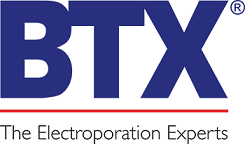Details
ECM 630 GENERATOR
The ECM 630 is an exponential decay wave electroporation generator providing a broad range of voltage and time constants for full flexibility in varying transfection applications. The ability to select the resistance and capacitance values, and adjust the range of voltages is the key to achieving the optimal time constants and field strengths needed for efficient transformation of prokaryote and eukaryote transfection. The ECM 630 can perform the widest range of electroporation applications among commercially available electroporation generators.
Flexibility is important, so BTX has designed a plug and play system for our ECM 630 system to transition between standard cuvettes and to 25/96-well plates using High Throughput Plate Handlers.
Note: Legacy ECM 630 Systems have been discontinued and replaced with New ECM 630 instruments.
This instrument is intended for Research and Pre-Clinical use only and is not for use in diagnostic or clinical procedures.
NEW ECM 630 FEATURES
- Large, easy to use color touchscreen interface
- Preset protocols for transforming the most common bacteria, yeast, and microorganisms
- High-Throughput Plate Handler setting for automatic processing of up to 96 samples at a time with an HT-200 Plate Handler
- Create, modify, and store up to 1,000 user defined protocols
- Enhanced Safety Features: Pre-pulse sample resistance check, arc protection, and over-current pulse abort
- Data Management: Experimental data log stores parameters of all pulses delivered and every sample resistance for QC and troubleshooting purposes
- Voltage range of 5 V to 3,000
- Capacitance range of 25 µF to 3,275 µF in 25 µF steps in LV mode; 10, 25, 35, 50, 60, 75, 85 µF in HV mode.
- Resistance range of 25 ohm to 1,575 ohm in 25 ohm steps.
APPLICATIONS
- Transformation of bacteria and yeast
- Transfection of mammalian cells
- Transfection of plant tissue and plant protoplasts
- High throughput 25- and 96-well electroporation
HIGH THROUGHPUT (HT) ELECTROPORATION
The High Throughput (HT) 96- and 25-well systems offer multi-well electroporation technology for processing multiple samples in seconds. Using the HT multi-well plates instead of traditional cuvettes, the researcher can transition from a single cuvette to either a 96-well or 25-well electroporation plate by using a plate handler. This increases yields and the number of experiment runs in a single day. Experiments take seconds to run, allowing for quick and efficient optimization of the electrical and biological parameters. Once optimized, samples are rapidly processed increasing yields and saving valuable time and money.
The key to the HT System is the combination of the ECM 630 Generator with the Plate Handler and multi-well plates. The Plate Handler holds the plates and delivers the pulse(s) to the wells using parameters set in the ECM 630 generator. The HT-100 Plate Handler provides manual track switching (45-0412, 45- 0422). New ECM 630 instruments are also compatible with HT-200 plate handlers for automatic processing of up to 96 samples at a time.
MONITORING OPTION
Addition of the ENHANCER 3000 allows the researcher to monitor and track key electrical parameters used in electroporation applications. The electrical pulse data is captured as both a graphic display of the wave form and electrical output values following each experiment.
INCLUDED ITEMS
| Item # | Product | Included Items |
|---|---|---|
| 45-2051 | ECM 630 Electroporation System Complete, with Safety Dome | ECM 630 Generator, Safety Dome, Cuvettes 1 mm, 2 mm, 4 mm pkg. of 30 (10 each), and Cuvette Rack 660 |
| 45-0651 | ECM 630 Electroporation System Complete, with Safety Stand | ECM 630 Generator, 630B Safety Stand, Cuvettes 1 mm, 2 mm, 4 mm pkg. of 30 (10 each), and Cuvette Rack 660 |
| 45-0652 | ECM 630 Generator Only | ECM 630 Generator Only |
| 45-0654 | ECM 630 High Throughput Electroporation System, 96-well with HT-100 | ECM 630 Generator, 96-Well Plates (2 mm gap, 2X), Plate Seals, HT-100 Plate Handler and a Plate Adaptor |
| 45-0658 | ECM 630 High Throughput Electroporation System, 96-well with HT-200 | ECM 630 Generator, Cuvette Safety Dome, Cuvettes 1 mm, 2 mm, 4 mm pkg. of 30 (10 each), Cuvette Rack 660, 96-Well Plates (2 mm gap, 2X), Plate Seals, HT-200 Automatic Plate Handler and a Plate Adaptor |
SPECIFICATIONS FOR THE ECM 630 GENERATOR
| Display Type | 7 inch color touchscreen interface |
| Power Source Voltage | 100 to 240 VAC, 50 to 60 Hz, CAT II Power 350 W (Pulsing), 35 W (Idle) |
| Fusing | Type 3AG, 5 A, 250 V 1/4 x 1 1/4 in; Type T (time delay) |
| Environmental Characteristics | |
| Intended Use | For research use only |
| Operating Temperature | 4° C to 40° C |
| Cooling | Convection through metal case |
| Relative Humidity | 20% to 80% RH, non-condensing |
| Mechanical Characteristics | |
| Footprint | 12.75" x 11.25" x 8.5" (W x D x H) |
| Weight | 16.0 lb (7.3 kg) |
| Controls | Touchscreen, On/Off power switch |
STANDARD CAPABILITIES
| Operational Status | Internal self test upon start-up |
| Interface | 7 inch color touchscreen user interface |
| Programmability | Storage over 1000 Protocols |
| Data Management | Experimental Log of Pulse Parameters and Sample Resistance |
| Input | 100 V to 240 VAC Universal |
| Charge Time | LV < 7 s, HV < 4 s |
| Arc Control | Yes |
| Voltage Range | LV Mode 5 - 500 V in 1 V steps; HV Mode 505 - 3000 V in 5 V steps |
| Capacitance Range | LV Mode 25 µF to 3,275 µF in 25 µF steps; HV Mode 10, 25, 35, 50, 60, 75, 85 µF |
| Resistance Range | LV Mode 25 ohm - 1,575 ohm in 25 ohm steps; HV Mode 50 ohm - 1,575 ohm in 25 ohm steps |
- Transformation of bacteria and yeast
- Transfection of mammalian cells
- Transfection of plant cells & plant protoplasts
- High throughput 25/96-well
| Item # | Product |
|---|---|
| 45-0110 | Flatpack Chambers, 0.56 mm gap, 80 µl volume, pkg. of 50 |
| 47-0206 | Flatpack Chambers, 4 mm gap, 10 ml volume, pkg. of 10 |
| 45-0109 | Flatpack Chambers, 1.83 mm gap, 1.5 ml volume, pkg. of 50 |
| 45-0466 | 25-Well Disposable Electroporation Plate, 2 mm gap, 100 µl, coated, 1 plate |
| 45-0467 | 25-Well Disposable Electroporation Plate, 2 mm gap, 100 µl, pkg. of 6 |
| 45-0465 | 25-Well Plate Adaptor for Plate Handlers |
| 45-0135 | Cuvette Plus, 2 mm gap, 400 µl, Sterile Pkg/10, Blue |
| 45-0450 | 96-Well Disposable Electroporation Plate, 2 mm gap, 100 µl, Coated, 1 plate |
| 45-0452 | 96-Well Disposable Electroporation Plates, 4 mm gap, 200 µl, 1 plate |
| 45-0530 | Adherent Cell Electrode, 5 mm gap |
| 45-0531 | Adherent Cell Electrode Kit, 5 mm gap, includes 45-0204 cable |
| 45-0134 | Cuvette Plus, 1 mm gap, 90 µl, Sterile Pkg/10, Gray |
| 45-0124 | Cuvette Plus, 1 mm gap, 90 µl, Sterile Pkg/50, Gray |
| 45-0450-M | 96-Well Disposable Electroporation Plate, 2 mm gap, 100 µl, 1 plate |
| 45-0125 | Cuvette Plus, 2 mm gap, 400 µl, Sterile Pkg/50, Blue |
| 45-0136 | Cuvette Plus, 4 mm gap, 800 µl, Sterile Pkg/10, Yellow |
| 45-0126 | Cuvette Plus, 4 mm gap, 800 µl, Sterile Pkg/50, Yellow |
| 45-0208 | Cuvette Rack, 20 numbered positions |
| 45-0400 | HT 100 Plate Handler, Manual Track Switching |
| 45-0401 | HT-200 Plate Handler, Auto-Sense Track Switching |
| 45-0207 | Safety Stand, Adjustable Gap (for use with Cuvettes) |
Legacy ECM 630 Technical Specifications
REFERENCES
Lee JH, Park SW, Kim YM, Oh JI. Functional Characterization of the CutI Gene for the Transcription of Carbon Monoxide Dehydrogenase Genes in Mycobacterium Sp. Strain JC1 DSM 3803. J Microbiol. 2017;55: 31-36.
Sun Y, et al. TMEM74 Promotes Tumor Cell Survival by Inducing Autophagy via Interactions with ATG16L1 and ATG9A. Cell Death Dis. 2017;8: e3031.
Hoppe PS, et al. Early Myeloid Lineage Choice is not Initiated by Random PU.1 to GATA1 Protein Ratios. Nature. 2016;535: 299-302.
Lee J, Jang YS, Papoutsakis ET, Lee SY. Stable and Enhanced Gene Expression in Clostridium Acetobutylicum using Synthetic Untranslated Regions with a Stem-Loop. J Biotechnol. 2016;230: 40-43.
Lin TL, Pan YJ, Hsieh PF, Hsu CR, Wu MC, Wang JT. Imipenem Represses CRISPR-Cas Interference of DNA Acquisition through H-NS Stimulation in Klebsiella Pneumoniae. Sci Rep. 2016 1721644.
Magalhães AC, et al. Peroxisomes are Platforms for Cytomegalovirus’ Evasion from the Cellular Immune Response. Sci Rep. 2016;626028.
Oakes BL, et al. Profiling of Engineering Hotspots Identifies an Allosteric CRISPR-Cas9 Switch. Nat Biotechnol. 2016;34: 646-651.
Rico AB, et al. Venezuelan and Western Equine Encephalitis Virus E1 Liposome Antigen Nucleic Acid Complexes Protect Mice from Lethal Challenge with Multiple Alphaviruses. Virology. 2016;499: 30-39.
Weger-Lucarelli J, et al. Development and Characterization of Recombinant Virus Generated from a New World Zika Virus Infectious Clone. J. Virology. 2016 Dec;91(1): pii: e01765-16.
Yamasaki S, et al. In Vivo Dendritic Cell Targeting Cellular Vaccine Induces CD4+ Tfh Cell-Dependent Antibody against Influenza Virus. Sci Rep. 2016;6: 35173.
Fernández-Sanlés A, et al. RNA Aptamers as Molecular Tools to Study the Functionality of the Hepatitis C Virus CRE Region. Molecules. 2015;20, 16030-16047.
Horng YT, et al. Molecular Analysis of Codon 548 in the rpoB Gene Involved in Mycobacterium tuberculosis Resistance to Rifampin. Antimicrob Agents Chemother. 2015 Mar;59(3): 1542-1548.
Jones SC, Price CT, Santic M, Abu Kwaik Y. Selective Requirement of the Shikimate Pathway of Legionella Pneumophila for Intravacuolar Growth within Human Macrophages but not within Acanthamoeba. Infecti Immun. 2015;83: 2487-2495.
Kim S, et al. Redox-Switch Regulatory Mechanism of Thiolase from Clostridium Acetobutylicum. Nat Comm. 2015 Sep;6: 8410.
Ren J, et al. Acetylation Regulates Survival of Salmonella Enterica Serovar Typhimurium under Acid Stress. Appl Environ Microbiol. 2015 Sep;81(17):5675-5682.
Wisniewski JA, Teng WL, Bannam TL, Rood JI. Two Novel Membrane Proteins, TcpD and TcpE, Are Essential for Conjugative Transfer of pCW3 in Clostridium Perfringens. J Bacteriol. 2015;197: 774-781.
Wei Y, Hu H, Lun ZR, Li Z. Centrin3 in Trypanosomes Maintains the Stability of a Flagellar Inner-Arm Dynein for Cell Motility. Nat Commun. 2014 Jun;5: 4060.
Kurth, M. et al. Reporter gene expression in cell culture stages and oocysts of Eimeria nieschulzi (Coccidia, Apicomplexa). Parasitol Res. 2009 Jan;104*2): 303-310.
Lama, A. et al. Glyceraldehyde-3-Phosphate Dehydrogenase Is a Surface- Associated, Fibronectin-Binding Protein of Trichomonas vaginalis. Infec Immun. 2009 Jul;77(7) 2703-2711..
Thyagarajan, B. et al. Creation of Engineered Human Embryonic Stem Cell Lines Using phiC31 Integrase. Stem Cells. 2008 Jan;26(1) 119-126.



 800-272-2775
800-272-2775
